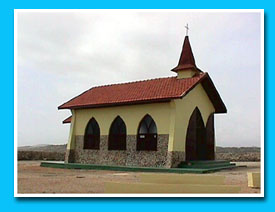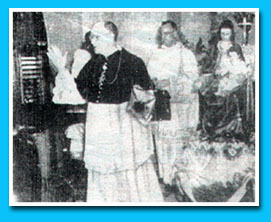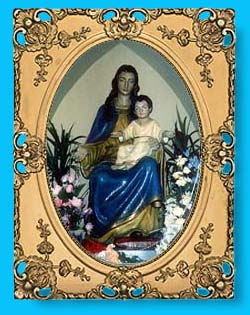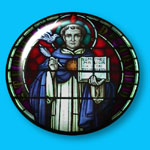 Issue3-August 1, 1998
Issue3-August 1, 1998
On the north coast, stands the chapel of
Alto Vista. Historians identify it as the birthplace of the catholic
religion on Aruba.
When most of the Indians moved to the north side of the island, with
them also moved some Spanish colonists. Together they formed the village
of Alto Vista and other small communities.
The colonists mostly lived in stone houses that distinguished them
from the Indians who preferred their traditional abodes.
One of them was Domingo Antonio Silvestre, he was of Spanish descend
and came from Coro.(Venezuela).
He was a devoted man, who taught the Indians to pray and use the rosary.
On Sundays and special occasions he would gather everybody to pray
the rosary.
Out of his own resources he built the first church on Aruba. Constructed
with stone walls and straw roof, it was completed on the 20th of April
1750. Domingo Antonio Silvestre became the religious leader in charge of
the church. It was dedicated to our Mother of the Rosary.
Three times a year a priest would come from Coro to perform catholic
services including baptisms, marriages etc. One of the priests that came
from coro to celebrate mass brought with him one day a cross
of about one foot high, and it was placed on the altar. There is evidence
that Domingo Antonio Silvestre was left the charge, that year, of assembling
the congregation and teach them how to pray.
I can not find further evidences on the rest of the life of Domingo
Antonio Silvestre or when he died. 
Miquel Enrique Albarez was the second person in charge; appointed by
Father Paulus de Algemesi, “priester” and missionary in 1752 (this date
can not be confirmed).
It is assumed that Miquel Enrique Albarez died between 1764 and 1772.
Domingo Bernardino Silvetre (son of Domingo Antonio Silvestre) was the
third and last person in charge of the church.
Domingo Antonio Silvestre and Miquel Enrique Albarez
are both buried near the church.
Around 1772 the village of Alto Vista was infected with a plague
(Black fever) which was deadly. Most people fled to neighboring villages
and the attendance to the church was minimal. Even Domingo Bernardino Silvetre
moved to the village of Noord where he participated in the building of
a second church, which is now known as the Sint Anna’s Church.
In 1816 the church of Alto Vista was closed down, on the order of Father
Johannes J. Pirovano.
The church of Alto Vista became desolated and fell to ruins.
A certain Gabriel Ruiz took the old Spanish cross from what was left of
the altar. The cross was passed down to Maria Johanna de Ruiz, then to
Magdalena Luydens, and finally to Francsica Henriquez lacle (Sjon Kita)
Sjon Kita is also a key person in the history of the church of Alto
Vista. She started a small school for girls, teaching them to sew and cook
as well as other activities like sports etc.
In 1946 she took the schoolgirls on a day trip, and went on the site
where the church of Alto Vista once stood, in search of its exact location.
When they found it, they also found in the remains a canister with
a picture of the Virgin Marie in it, two candles and some fresh flowers.
This meant that people were still coming here to pray. At that moment she
formed the idea of building something small, with a small altar dedicated
to the Virgin Marie, so that people could pray. She started to organize
picnics to raise funds to build the altar. When people heard about this,
they started to come from all parts of the island to give a helping hand.
On 16 of September she wrote a letter to Bishop Zeppenfeldt in Curacao
to get permission to build. It was refused on the reason that there
was no need for another church.
In 1950 they had raised the sum of Fls. 5000.00 (US$ 2858.00).
She left for Holland to buy a large statue of the Virgin Marie. It was
build under her  supervision
by the Dutch Company G. Linsen. In 1951 the statue arrived on Aruba. It
was first displayed at the church of Noord as the one at Alto Vista was
still not constructed. supervision
by the Dutch Company G. Linsen. In 1951 the statue arrived on Aruba. It
was first displayed at the church of Noord as the one at Alto Vista was
still not constructed.
Sjon Kita went to see Bishop Zeppenfeldt for the third time, and finally
he said, "do what you want to do". On March 19, 1952 they started to build
the church.
On May 23, 1952 the church was finally finished. Two
days later, Bishop Zeppenfeldt came to Aruba to bless the church.
On November 24, 1954 the Virgin Marie (Virgin of Alto Vista) was publicly
adorned with a golden crown inlaid with 78 gemstones
in the Whilhelmina stadium. Everybody on Aruba contributed with money and
golden rings or any valuable gold belongings they had.
Today, The church is opened from early morning for people to pray.
Once a week the priest of Noord will celebrate a mass.
Unfortunately, In 1997 a mentally ill person destroyed the statue of
the Virgin Marie beyond repair. It had to be replaced with a new one.
Personally I think that this was a great loss for the community. This
irreplaceable statue was acquired through hard work and represented a special
act of faith from the people of Aruba. By replacing
it with a new one, it removes a bit of the magic of this place.
Sjon Kita is now living her old age in Curacao
Photo Album


|





